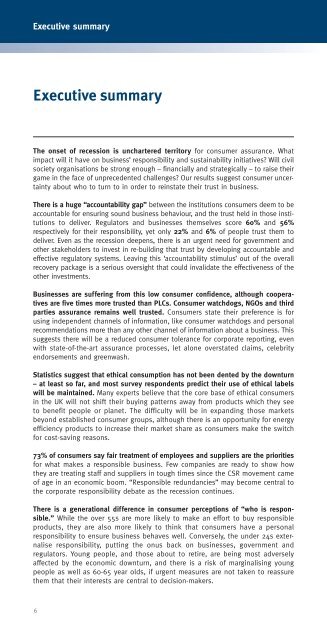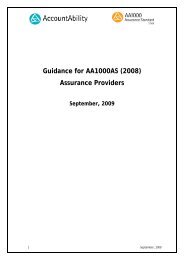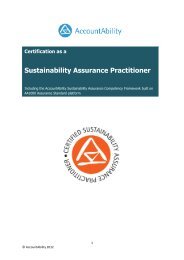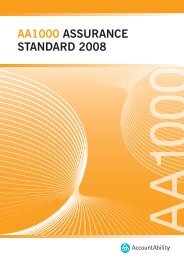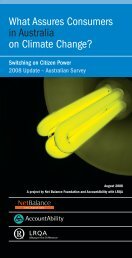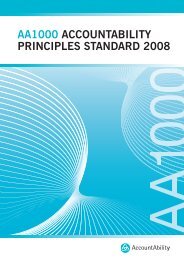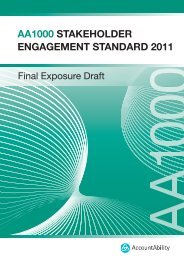What Assures Consumers in an Economic Downturn? - AccountAbility
What Assures Consumers in an Economic Downturn? - AccountAbility
What Assures Consumers in an Economic Downturn? - AccountAbility
You also want an ePaper? Increase the reach of your titles
YUMPU automatically turns print PDFs into web optimized ePapers that Google loves.
Executive summary<br />
Executive summary<br />
The onset of recession is unchartered territory for consumer assur<strong>an</strong>ce. <strong>What</strong><br />
impact will it have on bus<strong>in</strong>ess’ responsibility <strong>an</strong>d susta<strong>in</strong>ability <strong>in</strong>itiatives? Will civil<br />
society org<strong>an</strong>isations be strong enough – f<strong>in</strong><strong>an</strong>cially <strong>an</strong>d strategically – to raise their<br />
game <strong>in</strong> the face of unprecedented challenges? Our results suggest consumer uncerta<strong>in</strong>ty<br />
about who to turn to <strong>in</strong> order to re<strong>in</strong>state their trust <strong>in</strong> bus<strong>in</strong>ess.<br />
There is a huge “accountability gap” between the <strong>in</strong>stitutions consumers deem to be<br />
accountable for ensur<strong>in</strong>g sound bus<strong>in</strong>ess behaviour, <strong>an</strong>d the trust held <strong>in</strong> those <strong>in</strong>stitutions<br />
to deliver. Regulators <strong>an</strong>d bus<strong>in</strong>esses themselves score 60% <strong>an</strong>d 56%<br />
respectively for their responsibility, yet only 22% <strong>an</strong>d 6% of people trust them to<br />
deliver. Even as the recession deepens, there is <strong>an</strong> urgent need for government <strong>an</strong>d<br />
other stakeholders to <strong>in</strong>vest <strong>in</strong> re-build<strong>in</strong>g that trust by develop<strong>in</strong>g accountable <strong>an</strong>d<br />
effective regulatory systems. Leav<strong>in</strong>g this ‘accountability stimulus’ out of the overall<br />
recovery package is a serious oversight that could <strong>in</strong>validate the effectiveness of the<br />
other <strong>in</strong>vestments.<br />
Bus<strong>in</strong>esses are suffer<strong>in</strong>g from this low consumer confidence, although cooperatives<br />
are five times more trusted th<strong>an</strong> PLCs. Consumer watchdogs, NGOs <strong>an</strong>d third<br />
parties assur<strong>an</strong>ce rema<strong>in</strong>s well trusted. <strong>Consumers</strong> state their preference is for<br />
us<strong>in</strong>g <strong>in</strong>dependent ch<strong>an</strong>nels of <strong>in</strong>formation, like consumer watchdogs <strong>an</strong>d personal<br />
recommendations more th<strong>an</strong> <strong>an</strong>y other ch<strong>an</strong>nel of <strong>in</strong>formation about a bus<strong>in</strong>ess. This<br />
suggests there will be a reduced consumer toler<strong>an</strong>ce for corporate report<strong>in</strong>g, even<br />
with state-of-the-art assur<strong>an</strong>ce processes, let alone overstated claims, celebrity<br />
endorsements <strong>an</strong>d greenwash.<br />
Statistics suggest that ethical consumption has not been dented by the downturn<br />
– at least so far, <strong>an</strong>d most survey respondents predict their use of ethical labels<br />
will be ma<strong>in</strong>ta<strong>in</strong>ed. M<strong>an</strong>y experts believe that the core base of ethical consumers<br />
<strong>in</strong> the UK will not shift their buy<strong>in</strong>g patterns away from products which they see<br />
to benefit people or pl<strong>an</strong>et. The difficulty will be <strong>in</strong> exp<strong>an</strong>d<strong>in</strong>g those markets<br />
beyond established consumer groups, although there is <strong>an</strong> opportunity for energy<br />
efficiency products to <strong>in</strong>crease their market share as consumers make the switch<br />
for cost-sav<strong>in</strong>g reasons.<br />
73% of consumers say fair treatment of employees <strong>an</strong>d suppliers are the priorities<br />
for what makes a responsible bus<strong>in</strong>ess. Few comp<strong>an</strong>ies are ready to show how<br />
they are treat<strong>in</strong>g staff <strong>an</strong>d suppliers <strong>in</strong> tough times s<strong>in</strong>ce the CSR movement came<br />
of age <strong>in</strong> <strong>an</strong> economic boom. “Responsible redund<strong>an</strong>cies” may become central to<br />
the corporate responsibility debate as the recession cont<strong>in</strong>ues.<br />
There is a generational difference <strong>in</strong> consumer perceptions of “who is responsible.”<br />
While the over 55s are more likely to make <strong>an</strong> effort to buy responsible<br />
products, they are also more likely to th<strong>in</strong>k that consumers have a personal<br />
responsibility to ensure bus<strong>in</strong>ess behaves well. Conversely, the under 24s externalise<br />
responsibility, putt<strong>in</strong>g the onus back on bus<strong>in</strong>esses, government <strong>an</strong>d<br />
regulators. Young people, <strong>an</strong>d those about to retire, are be<strong>in</strong>g most adversely<br />
affected by the economic downturn, <strong>an</strong>d there is a risk of marg<strong>in</strong>alis<strong>in</strong>g young<br />
people as well as 60-65 year olds, if urgent measures are not taken to reassure<br />
them that their <strong>in</strong>terests are central to decision-makers.<br />
6


